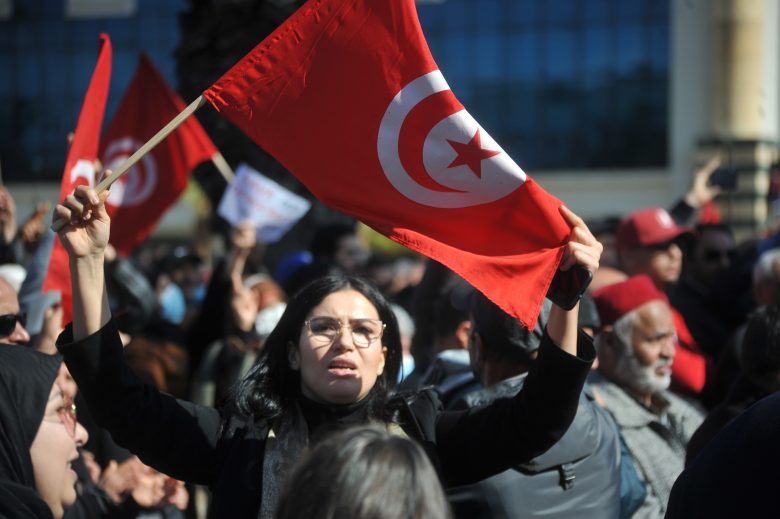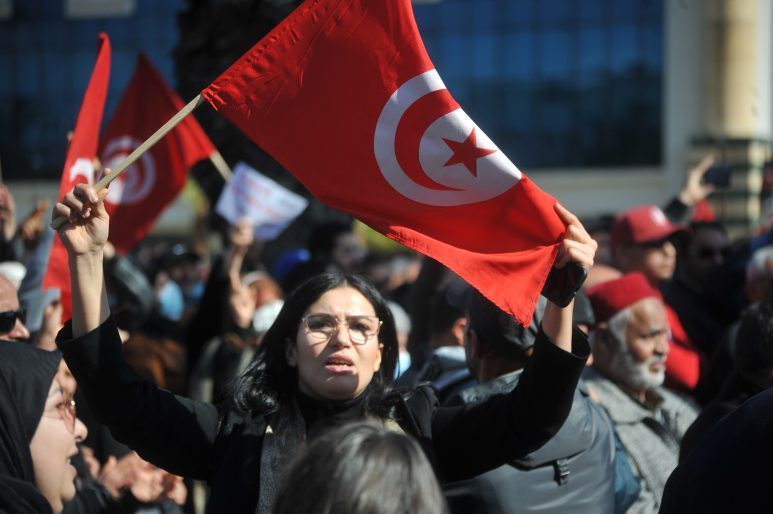By Hanene Zbiss, investigative journalist, Tunisia.
Tunisia’s presidential election on 6th October, 2024, resulted in a landslide win for President Kais Saied, who obtained 90.69% of votes. The electoral process was characterised by restrictions on journalists and activists. Today more than ever, freedom of expression and media and diversity are in danger in Tunisia, because of a return to censorship self-censorship, and persecution and imprisonment of journalists.
“We spent our time choosing our words when commenting on the electoral process. It was very hard!”, said Essia Atrous, journalist and former contributor at the private local radio station Mosaique FM. Nevertheless, on 31st July she and her colleague Kaouther Zantour received a warning from the Independent High Authority for the Elections (ISIE) for their presumed “intention to harm and mock the instance and the electoral process”. The two journalists used to comment on the work of the ISIE before the presidential election on a prime-time radio show named “Midi show”. “We were doing our job, and we impose a self-censorship on our speech, however, it was not enough for the ISIE.”

Essia and Kaouther were not the only journalists who suffered from pressure and harassment during the election. On 1st of August, the National Union for Tunisian Journalists (SNJT) denounced the ISIE after it sent warnings to four private radio stations accusing them of “not respecting the rules of transparency and objectivity in covering the electoral process”. SNJT said ISIE’s actions threatened the independence of journalists’ work.
The persecution on journalists
Since 2011, ISIE, which is responsible for organising elections in Tunisia, , has been heavily criticised for its management of the electoral process.It approved only three candidates, including President Saied, from a list of 14 presidential hopefuls. This was seen as an attempt to give Kais Saied the best chance of winning.
Some of the rejected candidates contested the decision in front of the administrative court, which ruled in their favour. But the ISIE refused to apply the court decision. Ahead of voting, one of the three presidential candidates, Ayachi Zammal was imprisoned for falsifying voter signatures on his candidacy paperwork, and had to run his electoral campaign from jail.In addition to these incidents, the electoral law was modified one week before e polling day.
To silence any critical voice, ISIE misused the law and persecuted activists and journalists by threatening them and taking them to court. This had an impact on the coverage of the election, which was not diversified and didn’t respect the need of the public to be informed.
According to Aymen Zaghdoudi, professor of law, “Legally speaking, the ISIE has not the right to decide to stop a TV or a Radio show or to withdraw the agreement of a media, but it can carry out judicial prosecutions against journalists or their media.” That’s why journalists and activists who noticed that the justicial system was taking seriously the complaints against their colleagues “felt afraid and started to practice self-censorship in their speeches”.”
Decree-law 45: The sword of Damocles
One of the most powerful legal weapons used by the electoral authority and the regime to silence their opponents is the decree-law 54 on fighting cyber criminality. Since its promulgation in September 2022, this law has been employed to sue and imprison political figures, activists from civil society, and journalists. Article 24th carries a prison sentence of five years for disseminating fake news on communications networks. This penalty can rise to 10 years if the victim of this offence is a “public official”.
A long list of journalists have been involved in legal cases because of complaints filed against them by ministers or public employees from the administration using the decree-law 54. They include Monia Arfaoui, Haythem Mekki and Nizar Bahloul. Other journalists are currently in jail, such as Sonia Dahmani, Mohamed Boughaleb, Mourad Zeghidi, Borhane Bessaies. Their crime is that they criticised the regime in mainstream media or on social media.
“The decree-law 54 becomes like a sword of Damocles hanging over our heads as journalists. Any declaration or opinion that does not please the regime could lead to legal persecutions and imprisonment. In the end, a lot of us are imposing self-censorship”, notes Karim Wannes, member of the SNJT executive board.
The decree-law is not the only one used against journalists. Other repressive laws are also employed, such as the penal code, the telecommunication code and the anti-terrorist law. According to the annual report about the state of freedom of press in Tunisia, published by the SNJT in May 2024, those laws were used to charge journalists in 39 cases.
Censorship and impact on media diversity
This climate of fear and suspicion affects journalistic content. Many private sector media organisations haveremoved political programmes from their schedules or changed their news commentators and replaced them with those who are not critical of the regime. TIn one case, the political radio program “MidiShow” removed its star commentators Zied Krichen and Haythem Mekki.
The public media are totally controlled by the regime and have become a “propaganda tool” for it. New directors, reputed to be close to power, were nominated as the heads of the national television and the public press agency (Tunis Afrique Presse).
A new project to merge two ewspapers is currently being set up. It involves La Presse (French-language pro-government newspaper) and Assabah (Arabic-language and former private and independent newspaper). “We don’t know a lot of information about this project, but we are wondering how we can make a fusion (merger) of two newspapers that are completely different. Which editorial policy will be adapted for the new project after the merger? It is highly likely that it will reflect the regime’s vision”, says Essia Attrous, who retired from Assabah this year after 35 years working for the newspaper.
State control of the public media and the continual harassment of journalists in the private sector as well as the merger of media companies deeply affects the diversity of the media landscape and has an impact on the quality of information presented to the public. “Today, the different media make one voice heard, the voice of the regime. The work of journalists becomes more communicational than journalistic. They prefer to diffuse the official press release, than to analyse or comment on the information,” notes Karim Wannes from the SNJT.
This gloomy picture is compounded by economic difficulties faced by several media companies. According to SNJT, “80% of private media in Tunisia are under threat of closure”. This situation is due in part to the political climate but also to the economic crisis in the country that affects the advertising market. As a result, a lot of journalists have lost their jobs, while others work for months without receiving their salaries.
An uncertain future for alternative media
Several alternative media organisations have been set up since 2011, distinguished by their quality and modern journalistic content. Media like Nawaat, Inkyfada, Al Qatiba, Kashf Media and others, have succeeded in attracting public attention through their investigations that denounced corruption and different forms of abuses. Nevertheless, those media are also facing challenges due to press freedom restrictions.
“As an alternative media, we are afraid for our future because we feel that we are in the firing line of the regime, since we are independent, critical and we cover topics that other media from the public and private sector could not treat”, explains Aymen Touihri, editor in chief of Kashf Media.
They also face thechallengeof funding. Almost all of them are financed through NGO funds, but the parliament is about to adopt a new project law that restricts funding for NGOs and subjects them to control by the authorities. This new project law comes at a time when local and foreign associations are being accused by President, Kais Saied of serving the interests of “foreign powers”.
Some alternative media are checking other sources of financing in order to secure their future. “We are thinking of creating some commercial activities that can bring us some funds that we could use to finance our media”, explains Aymen, who remains sceptical about the future.
After the presidential election, the general climate regarding freedom of expression has become more dangerous. A few weeks after the polls, the regime turned its attention to female Instagrammers and content creators. At least seven of them were sentenced to prison terms ranging from 18 months to four and a half years. Their crime: “offending public decency”.
The future of freedom of expression and diversity in the media remain uncertain in the country that sparked off the Arab Spring.
Picture from https://www.shutterstock.com/fr/g/med_aziz_soufi
Disclaimer:
The views and opinions expressed in this article are solely those of the author and do not reflect the official policy or position of the Media Diversity Institute. Any question or comment should be addressed to [email protected]

